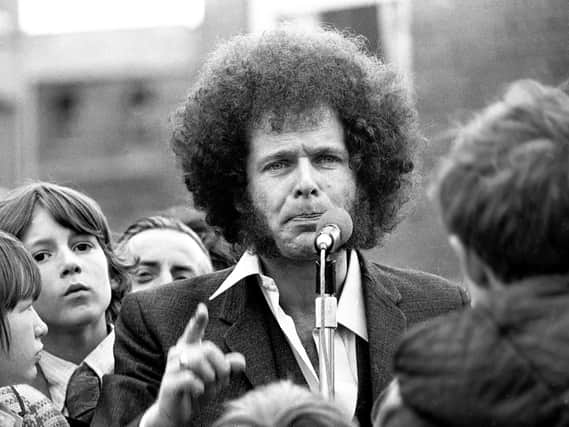Eamonn McCann: Look at how far we have come - and the long, daunting road ahead of us


It led the news not only in Ireland and Britain but in the US, Australia and many points in between.
The march was a moment of global significance, an integral element of something huge that was happening all over world.
Advertisement
Hide AdAdvertisement
Hide AdEverywhere you looked, there was tumult and war. Villages huddled in the hills and jungles of south east Asia were aflame, drenched in Napalm from US ‘planes.
Martin Luther King was murdered in Atlanta in April. Fighting flared as young African Americans erupted from the ghettoes.
Students in France occupied the Sorbonne the following month and tore up cobble-stones to fight the paramilitary police.
The people of Prague rose up in August against invasion by the Soviet Union.
Advertisement
Hide AdAdvertisement
Hide AdIn September, Chicago mayor Richard Daley had called in 25,000 city, State and federal officers to batter anti-war demonstrators outside the Democratic convention into submission: “I said to (the police chief) very emphatically that an order be issued immediately to shoot to kill any arsonist or anyone with a Molotov Cocktail and to shoot to maim or cripple anyone looting.”
Daley now shouted at a Jewish delegate to the convention who had condemned his encouragement of police violence: “F--- you, you Jew son of a b---, you lousy mother---, go home.”
Daley was a big supporter of civil rights in the North.
Some months later, Bernadette Devlin (McAliskey), in Chicago on a tour of the US, refused to meet Daley. That was enough for many prominent Irish-
Americans. Bernadette was ditched. No Nationalist leader back home spoke up for her or spoke out against Daley.
Advertisement
Hide AdAdvertisement
Hide AdThere was a logic to this lack of principle. Taking on racist goons like Daley would alienate some who might proclaim their support for civil rights in the North but remained dead set against extending civil rights to people far closer to home.
The same narrow Nationalist view surfaced again in 2006 when members of the Derry Anti-War Coalition occupied the Springtown plant of Raytheon, the third biggest arms manufacturer in the world.
The immediate trigger was the Israeli assault on southern Lebanon using Raytheon bombs to pulverise local people.
In 2010, Raytheon was still clinging on in Derry, propped up by both Nationalist and Unionist parties. The company’s missiles were now falling like a downpour of death on Palestinians. A second occupation, by nine women, spooked the company.
Advertisement
Hide AdAdvertisement
Hide AdRaytheon pulled out of Derry, complaining that the authorities had proved unable to protect them from the likes of Diana King, Roisin Barton, Goretti Horgan, Roisin Bryce, Jackie McKenna, Kitty O’Kane, Sharon Meenan, Julia Black, Helen Deery and Betty Doherty. Civil rights heroines all, in my book.
The same argument which had been raised in relation to Daley quickly re-surfaced: forcing the removal of Raytheon would discourage other US multi-nationals from investing here. The civil rights of the Palestinian people took second place to the interests of a giant arms company.
More than half the US/Saudi weapons shredding Yemen today are of Raytheon manufacture.
Shouting out against the presence in our midst of merchants of death and deniers of rights was exactly in tune with the spirit of 1968.
Advertisement
Hide AdAdvertisement
Hide AdOctober 5th doesn’t belong to any particular political tendency. The march was organised by a group which was fairly loose in its structures, insofar as it had structures, but fairly united in action. We had come together mainly through involvement in the Derry Housing Action Committee - members of the
Labour Party, the Young Socialists, the Republican Clubs, and, most of all, people of no particular political allegiance.
The political landscape has greatly changed since. The Labour Party and Young Socialists are no longer in operation. The Republican Clubs became
Sinn Fein The Workers’ Party and then the Workers’ Party. Some who were active in the early days went on to form the SDLP. Today’s Sinn Fein emerged as a breakaway from the Workers’ Party. And so on.
What continues, unchanged and unabated, is the struggle.
Advertisement
Hide AdAdvertisement
Hide AdThe bottom-up, people-power strategy of the early movement is best expressed now in the battle for women’s rights and the rights of the LGBTQ community, in the mass campaign which saw off water-charges North and South, in mobilisations to defend the environment, in the effort of socialists and trades unionists to combat austerity and to win back employment rights stolen by Thatcher’s anti-union laws. (More accurately, the Executive’s anti-union laws, devolved to Stormont and imposed by successive Executives.)
My own thoughts today are mainly on those no longer with us. Johnnie White, Red Mickey Doherty, Cathy Harkin, Seamus O’Kane, Willie Breslin, and so many others. Each of them was an inspiration and should be remembered whenever we look at how far we have come and at the long, daunting road ahead of us.
A luta continua.